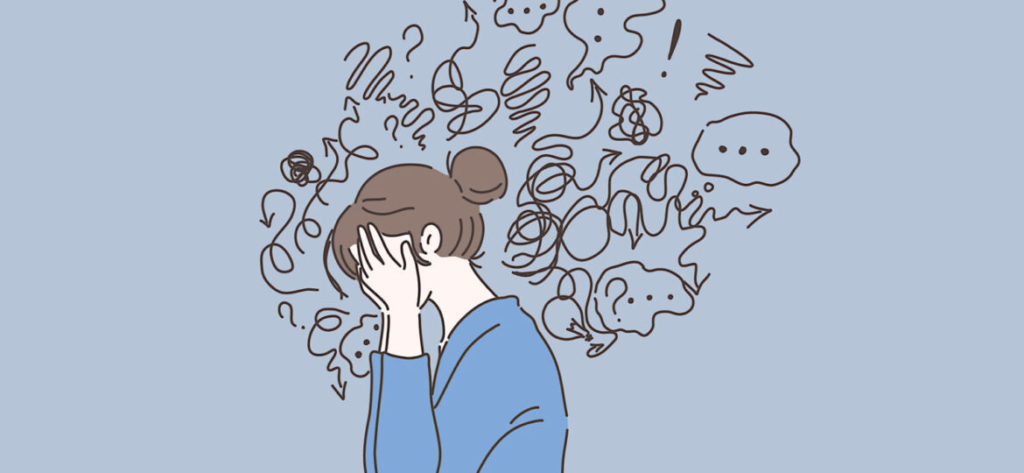Physical, mental and emotional responses are all relevant symptoms

We all feel fear, worry and stress at different moments in our lives. And sometimes, those feelings have the power to overwhelm us. But if that’s a common human condition, how do you know if you’re experiencing a healthy amount of anxiety or if you have an anxiety disorder? Where is the line?
Registered psychotherapist Natacha Duke, MA, RP, says it all depends upon the frequency and extent of your anxiety.
When is anxiety something you should worry about?
We all feel some degree of anxiety when confronted with a threat — either real (like when a car swerves into your lane) or perceived (like a pending work meeting). Both situations can trigger adrenaline and your body’s fight-or-flight response, a physiological reaction that prepares you for survival.
Perceived threats can often feel like actual threats to our well-being, even though there may be no real harm. But whether these threats are perceived or not, any threat can feel real enough when they put us on edge and trigger our ability to feel anxious.
In any of these situations, you may notice several signs of anxiety. You can have a physical response, like:
- A racing heart.
- Sudden perspiration.
- A knot in your stomach.
- Nausea and vomiting.
- Muscle tension.
Other symptoms that might surface include:
- Restlessness.
- Fatigue.
- Difficulty focusing.
- Irritability and mood changes.
- Inability to sleep and other sleep disturbances.
The symptoms of anxiety vary from person to person, and they grow in severity based on the cause of stress. But in most cases, anxiety occurs when a perceived threat triggers these symptoms for a prolonged period of time and disrupt your daily life. You can experience physical signs of anxiety or mental and emotional signs of anxiety, and sometimes, even all of them at once.
The key to understanding when anxiety needs managed is knowing how it shows up in your day-to-day life. Duke breaks anxiety down into common anxiety disorders, with varying symptoms:
- Panic disorder. You may experience extreme panic or panic attacks. It may feel like heart palpitations or pounding, shortness of breath or choking.
- Phobias. Your anxiety peaks when you encounter certain things, like small spaces, social situations or leaving your house. You may experience nausea, sweating or trembling.
- Obsessive compulsive disorder. You have fears — of germs, for instance — that cause you to compulsively perform rituals, such as constant hand-washing.
- Post-traumatic stress disorder (PTSD). A traumatic event triggers this type of anxiety. You may experience panic attacks or more general symptoms like sleep problems, muscle tension or constant worry. These attacks associated with PTSD can come up out of nowhere, even when the cause is unidentified, but they’re often rooted in a past traumatic experience.
- Generalized anxiety. Consistent anxiety that hangs around and isn’t triggered by particular causes characterizes this anxiety type. You might experience any of the above symptoms at any time. Duke says it’s like, “Always feeling a little revved up and not in a positive, exciting way.”

When to reach out for help
There are a few factors that can help separate “normal” anxiety from clinical anxiety that would benefit from treatment, clarifies Duke. Factors to consider include:
- Intensity. Does your anxiety cause significant discomfort or intolerable symptoms? Do you have difficulty managing those symptoms when they occur?
- Frequency. Are you noticing your anxiety creeping up more often?
- Duration. Do your symptoms linger beyond the anxiety-inducing experience? For example, when you’re stressed out about a test, does your stress linger all day or even into the next day? Or are you anxious about everything and nothing all the time?
- Interference. Does your anxiety reduce your ability to function so you can’t work or do other tasks?
- Triggers. Do you have triggers that make you feel helpless? Do you have so many triggers that you stop doing things like leaving your home or driving on the freeway?
- Affect on your life overall. Consider how the anxiety is affecting all areas of your life, like work, relationships and being a part of your community. How would your life look if you didn’t have the anxiety? Would it be significantly different?
“You really have to think about how much it affects your functioning,” Duke says. “You may be able to avoid some triggers, such as spiders. But if you are afraid of social situations, that’s harder to avoid and will likely impact your life much more.”
If you experience any symptoms of anxiety that consistently disrupt your life or make daily activities difficult, and it’s affecting your ability to function for up to six months, you should talk to a healthcare provider or therapist about the possibility you may have an anxiety disorder.
How treatment works
If you decide to seek treatment, you may start with your primary care provider. Most doctors can help you get a good idea of how severe your anxiety is. They then may recommend medication, therapy or both.
Two types of medication may help manage your symptoms:
- Daily. You can take some medications regularly to prevent anxiety as a whole.
- As-needed. You can take medications only when an episode occurs to lessen how your body reacts to specific moments that trigger your anxiety. This is perhaps most helpful when providing clarity to a specific situation or managing physical symptoms of anxiety like muscle tension, nausea and stomach ache in the moment they happen.
Your healthcare provider might also refer you to a psychiatrist, who can help manage your medication.
In many cases, working with a registered therapist can help you learn how to prevent anxiety in the first place. A tool they use is cognitive behavioral therapy, which helps you better understand your anxious moments and learn coping strategies for when anxiety strikes. You can often learn to manage anxiety with fewer than a dozen sessions. And Duke says combining medication and therapy is often highly effective at reducing anxiety.
If your anxiety is debilitating, talk with a healthcare provider about your specific needs. If you’re aware of the problems anxiety is causing, you can become equipped with the right management tools for your specific situation.
“You may not need medication or therapy for life,” says Duke. “But addressing the issue is important because sometimes anxiety can get worse over time if it’s not treated.”
Source: https://health.clevelandclinic.org/signs-of-anxiety
